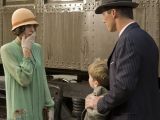“Los Angeles, 1928. A true story.” Writer J. Michael Straczynski and director Clint Eastwood make it a point of showing, from the very beginning, what we’re to expect from the 2008 “Changeling.” This is not, they seem to say, just another Hollywood production based, even loosely, on actual facts, this is, without a single doubt, a true story. In some respects, they are right to the point: “Changeling” is different from the rest of the movies released last year, but a true story it is not. That does not mean, however, that it lacks quality for starting off on the wrong premise.
In 1928, a young mother working as a call operator, Christine Collins (played by Angelina Jolie), arrives home one night to find out that her 9-year-old boy Walter has gone missing. After searching the neighborhood, she calls the police, which are, as expected, unapologetically unhelpful. Five months later, after a lengthy investigation of the LAPD, Christine is told that her son has been found after being abandoned by a drifter in a diner, and is asked to come to meet him at the train station, where journalists have already been summoned to immortalize the moment and, thus, put an end to a period of bad press for the force.
The moment Christine’s eyes meet those of the supposed Walter, she realizes that the boy in front of her is not her son. At the insistences of Captain J.J Jones (Jeffrey Donovan), Christine agrees to take the boy home “on a trial basis,” in the hope that she will eventually come to the same conclusion as the police, namely, that the boy had been through enough and was consequently changed beyond recognition. However, a mother always knows best, and “the Collins woman” simply won’t accept that the boy she has now living under the same roof as she is actually her son. It’s from here that things begin to get really complicated.
“Changeling” runs a total of 141 minutes, which may seem a bit too much, especially for those viewers who are not that fond of period pieces. As a matter of fact, this seems to be the only thing going strong for this film, as the story in itself often seems one-dimensional, as also do the characters, who are so flawless (either just bad or simply too good to be true, as is the case with Christine) that it’s as if Eastwood intentionally made them that way. Granted, Angelina is stunning in her portrayal of a desperate mother who would fight anyone tooth and nail to resume the search for her lost boy – were one to draw a parallel between her acting and her personal life, it was only normal that she be that brilliant in this film.
Sadly, other than Angelina’s take on Christine (and even this statement comes with a huge “but,” since some of her outbursts have been deemed too studied and carefully orchestrated to make audiences able to relate to them), and the beautiful settings, there is not much to speak in favor of “Changeling.” John Malkovich, a brilliant actor who here plays the part of Reverend Gustav Briegleb, the only one to stand by Christine in her plight, is either not given enough screen time or put in second because the focus is all on Jolie.
Few are the moments in which Malkovich is allowed to be the wonderful thespian we know, and this is yet another of Eastwood’s faults, critics say. Paradoxically, it’s a minor character that unintentionally steals the show in the few moments he’s allowed on screen – Gordon Northcott, the Wineville Chicken Coop murderer, devilishly portrayed by Jason Butler Harner. However, he too is just as one-dimensional as the other characters, having no redeeming feature, just like Christine is flawless and can do no evil.
Nevertheless, the attention to details that is so painfully obvious in “Changeling” is truly something that Eastwood should receive credit for. The settings do not simply resemble things in the ‘20s, but are so vividly rendered, that seeing this film is almost like taking a step back in time. The automobiles, the street cars, the policemen with their gangster attitude, impeccable raincoats and a cigarette dangling in the corner of the mouth, the outfits, and even the mentality of the time are beautifully rendered.
Seeing “Changeling,” one almost becomes outraged at the Audacity of men, and policemen in particular, regarding women, at the injustices being made under the shield of the badge, and at the deaf ear authorities turn on everything that does not fit with the official line. From this perspective and mostly because of this, Christine’s story almost manages to wrench a tear from viewers – not because, as noted above, they can relate in any way to what’s being narrated onscreen, but because of the way in which it is being said.
“Changeling” was released in the US in October 2008. It opened in Australia on February 5, and will conclude its run in international theaters on February 20 in Japan.
The Good
The Bad
The Truth

 14 DAY TRIAL //
14 DAY TRIAL // 




